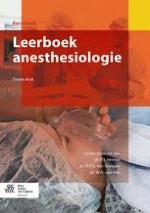Gepubliceerd in:
2013 | OriginalPaper | Hoofdstuk
7. Farmacologische basisprincipes
Inleiding
In de dagelijkse praktijk worden anesthetica gedoseerd op basis van een ruwe inschatting van de behoeften van de individuele patiënt. Deze inschatting is gefundeerd op een basaal begrip van de farmacokinetiek en farmacodynamiek van het gebruikte anestheticum en de patiëntvariabelen die hierop van invloed zijn. Een goede inschatting van de farmacokinetiek en farmacodynamiek in de individuele patiënt is van groot belang, gezien de bijwerkingen van de meeste anesthetica. Onbedoeld lage anestheticaconcentraties kunnen tot onbewuste pijngewaarwording en/of ongewenst bewustzijn leiden tijdens de operatie, onbedoeld hoge anestheticaconcentraties kunnen aanleiding geven tot ongewenste cardiovasculaire of respiratoire depressie. Het doel van dit hoofdstuk ligt in de beschrijving en verduidelijking van de basale farmacokinetiek en farmacodynamiek zoals die van toepassing zijn op de klinische anesthesiologische praktijk.
